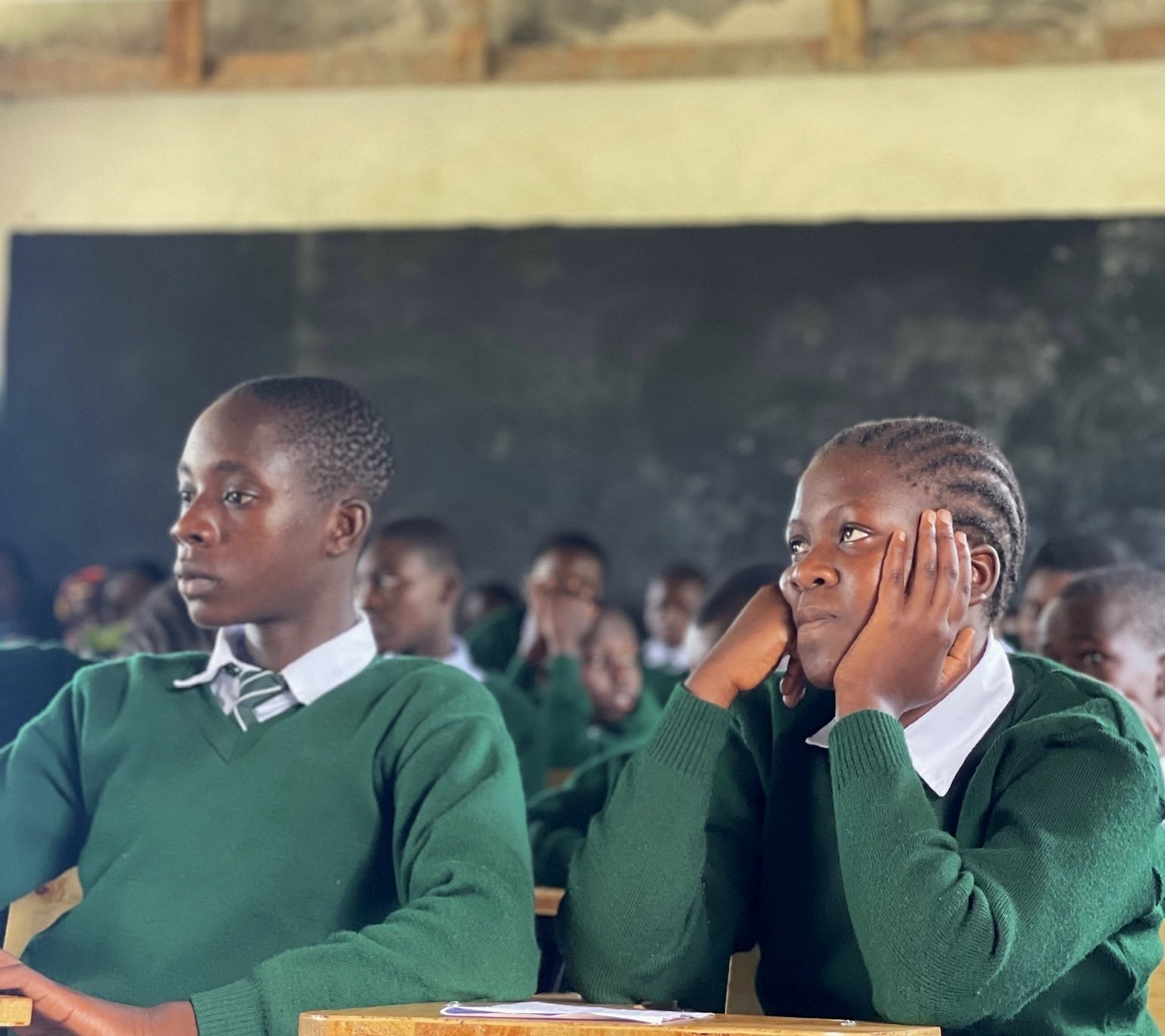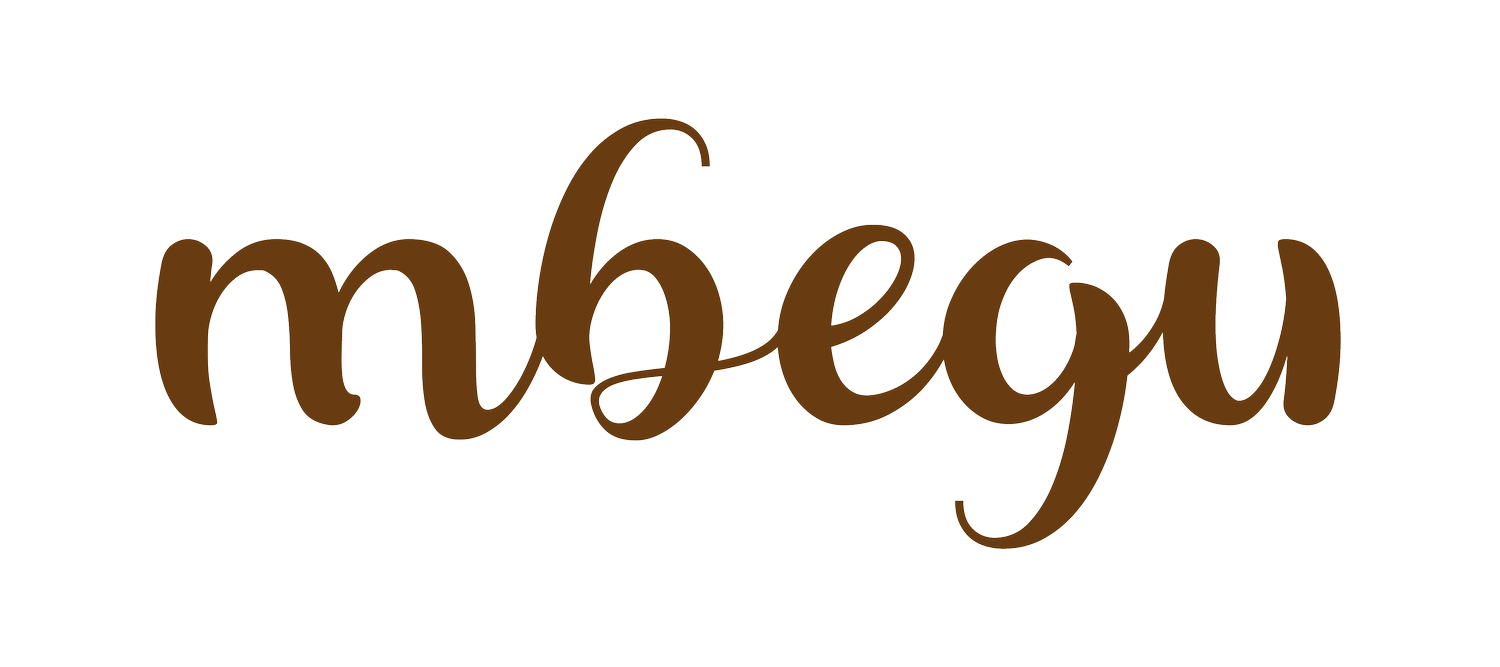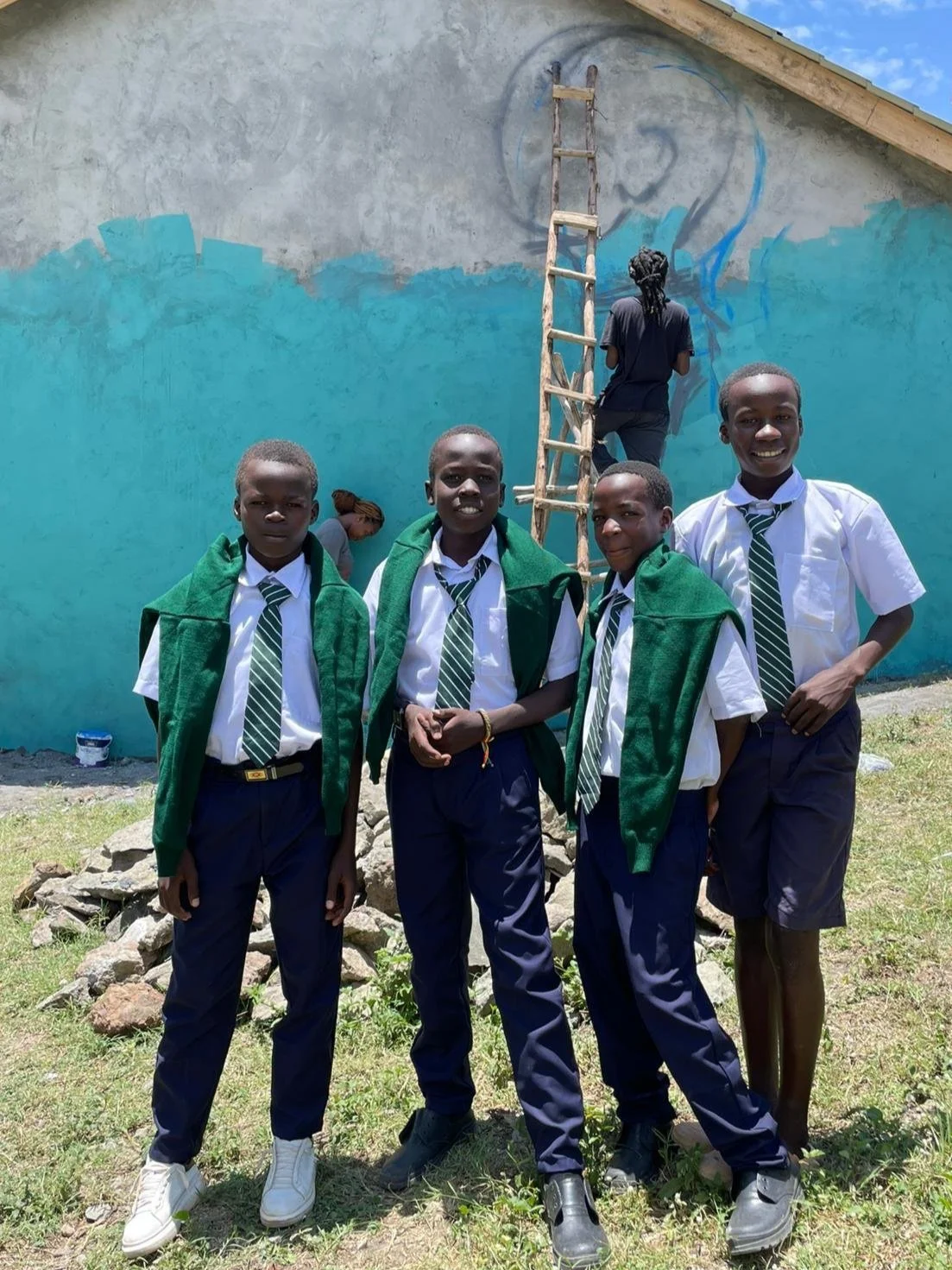
About us
-
Mbegu, meaning “seed” in Swahili, is a nonprofit organization dedicated to nurturing children’s aspirations and empowering them to create lasting change in their communities.
Just like a seed holds untapped potential, Mbegu believes every child possesses unique greatness waiting to be cultivated. Through education, mentorship, and empowerment, we awaken curiosity, ignite passions, and provide the tools for success.
-
In the heart of Lake Victoria, Kenya, lies a small island where dreams take root. Mfangano is a place where magic intertwines with the promise of a brighter future. It is a sanctuary of joy and tranquillity, offering a unique setting for our endeavours.
We wholeheartedly believe that when equipped with the right resources and opportunities, anyone can build their dreams into reality. Mbegu is paving the road for students and islanders to build their own aspirations and goals to drive change within their community.
-
In January 2024 we welcomed the first batch of 30 students from Saint Mary Academy School into our higher-education program.
To support their life journey and fulfil Mbegu's vision, we must also provide the necessary infrastructure to cater to their primary needs.
We are building a high school with boarding facilities where they can access the national school curriculum free of charge. In Kenya, there is no free education, and tuition fees are prohibitively expensive in both public and private schools. By waiving these fees and offering high-quality education without cost, we ensure that these young boys and girls have the opportunity to learn and build a promising future for themselves.
In addition to their compulsory education, we foster their personal growth through initiatives that encourage emotional intelligence.
Our goal is to create a secure environment that nurtures a family-like atmosphere and motivates them to become the individuals and professionals they aspire to be.
-
At Mbegu, we believe in empowering children beyond the confines of a traditional curriculum. Our focus lies in nurturing their emotional intelligence and cultivating vital soft skills that will enable them to:
build inner confidence and self-awareness;
unleash creativity and curiosity;
develop strong interpersonal abilities, communication and empathy;
sharpen critical thinking and problem-solving.
-
By creating opportunities that enrich their life experiences and providing a diverse range of workshops in various areas:
Personal Development: this includes fostering self and social awareness, addressing sexual health and financial literacy amongst others.
Employability and Self-Sufficiency Skills: workshops will cover practical skills such as bread-making, cooking, fishing, gardening, tailoring, engineering, mechanics and accounting, empowering the students to become self-sufficient and ready for potential job opportunities.
Arts and Creativity: nurturing artistic expression, we offer workshops in theatre, dancing, painting, music, photography and fashion design to encourage creativity and self-expression.
Cultural Awareness: to broaden their horizons, we introduce foreign language workshops, and interactive sessions on geography and culture and organize school trips within Kenya, exposing them to different localities.
Mentorship Programs and Role Models: students will benefit from motivational conversations and interactions with individuals from similar backgrounds who have achieved diverse successful careers, providing them with valuable guidance and inspiration.
This forms the essence of our work. We begin by conducting a needs assessment, supported by a psychologist, to gather essential information and tailor a comprehensive plan that aligns with the local context and challenges. These educational initiatives are thoughtfully integrated into the school curriculum, and we equip teachers and caregivers with the necessary knowledge and skills to effectively nurture the emotional growth of the students.
-
Building a high school allows us to create multifunctional spaces where we can develop quality workshops and classes to promote and nurture the innate talents of the children involved. The high school serves as the foundation of our project, as we must care for and protect the children too.
Currently, we have built two classrooms (where one for now is acting like a girls dormitory) and four toilets (two for boys and two for girls). By January 2025, our goal is to construct more facilities: two classrooms, and one office; along with two dormitories, to separate boys and girls. We anticipate that the construction of all the infrastructure will progress steadily over the next three years, depending on our resources and income.
Once the school year begins in February 2024, we will establish a living routine for our students and incorporate these workshops and initiatives into their curriculum, as well as extra-scholar and weekend activities.
Moving forward, our success relies on consistency, perseverance, continuous evaluation and support. We understand feedback from students, teachers and parents is essential to assess the impact and make necessary improvements. We provide ongoing support and resources for teachers to ensure the sustained integration of emotional intelligence education into the high school’s culture and practices.
We aim to plant the seed and provide the tools to cultivate and nurture their dreams.
-
Our work extends far beyond individual impact – it encompasses empowering the entire community. At Mbegu, we collaborate closely with locals, fostering a sense of ownership and nurturing a circular economy that uplifts families and fuels the education of their children.
By prioritising the perspective of the community members and actively listening to their needs, we create an ecosystem of mutual support and respect that allows both to fulfil our purpose.
We work with locals and islanders in our construction projects, contributing to their businesses and generating an income opportunity for our neighbours. From February 2024, we've employed:
3 teachers,
1 grounds manager and security guard,
2 cooks/housekeepers.
Mbegu’s co-founder, Jim Walker Peter, was born and raised on the same island where we are building the high school. He is a crucial part of our effort to support practices that empower his community and foster self-sufficiency.
-
In our pursuit of creating a promising future for others, we are mindful of the pitfalls that plague well-intentioned efforts. Mbegu differentiates itself by embracing a conscious approach that safeguards against harmful attachment patterns and negative co-dependency.
We are committed to challenging and dismantling the white-saviour complex and decolonizing international volunteering. We continuously educate ourselves to ensure our actions have a positive and sustainable impact on the community we serve.
Mbegu is compromised to drive sustainable development long-term. We promote practices for self-sufficiency and strive to create opportunities for economic growth within our school and the community. Since 2021, we have sustained our steady progress by selling local handmade totes and accessories. Although we aim to explore other commercial ventures and scale this area of funding, donations and other form of economic support play a crucial role in sustaining and enhancing the project’s impact, covering start-up costs, subsidizing free education, facilitating growth, and ensuring the provision of quality education to our students.
It’s important to acknowledge that achieving complete financial independence can be a gradual and complex process. We balance self-sufficiency practices with realistic expectations and the need for financial support to achieve long-term sustainability and success.
-
Reflecting on our journey, we take immense pride in the tangible achievements we have accomplished thus far thanks to your support. From cleaning our land to reinforcing the property with fences and gates, from bringing the power of electricity to our ongoing efforts in establishing a reliable water and septic system, we are building a solid foundation for an outstanding program on the island.
We are very proud of how the school is taking shape. Today, we can claim that we have built 2 classroom, 4 toilets and Kasaluna (two guests rooms with bathrooms).
With your contribution, we can continue to make incredible progress and take our operations to the next level.
You can impact others and create a collective movement for change.
Do you want to know more?
-
No, all our members do voluntary work. Only when we work with locals -whether during construction work or with the artisans that make our accessories- do we remunerate their work. When the school opened in 2024, we hired school teachers, cooks and a grounds manager. Like this, we offer an opportunity to our community members, to generate an income and support their families.
In the future, we aim to grow and reach a point where we can manage the charity operations onsite as a full-time job. But for now, we prioritise the use of funding to build our educational centre and the monthly maintenance of our students.
-
Not as such.
Volunteering programs can unintentionally perpetuate a "white saviour" narrative due to factors such as imbalanced power dynamics, short-term impacts, limited expertise, and cultural insensitivity.
Such programs might inadvertently create dependency, misallocate resources, tokenize local communities, lack accountability, and fail to prioritize the needs and agency of the communities they aim to help.
Addressing these concerns requires careful program design, cultural awareness, long-term commitment, and a focus on empowering local communities in sustainable ways.
We are in the process of carefully designing an ethical and impactful approach to volunteering that aligns with our mission and values. We believe in creating meaningful experiences that contribute positively to the communities we serve. However, we want to ensure that any volunteering programs we offer truly empower and support those communities in a sustainable way.
While we're working on developing these opportunities, we encourage you to stay connected with us for updates on our initiatives.
-
Poverty and suffering exist globally, and addressing these issues requires collective efforts from individuals, organizations and governments around the world. Some countries don’t have the socioeconomic structure to impact their own development. They may lack, not just material resources, but also the emotional skills to drive change.
It’s possible to support local and global causes simultaneously. We see helping others in need as a fundamental aspect of compassion and empathy. The very skills needed to create strong human connections and a united movement that promotes progress towards equality.
-
Donations and other forms of economic support play a crucial role in sustaining and enhancing the project’s impact, covering start-up costs, subsidizing free education, facilitating growth, and ensuring the provision of quality education to our students.
With a one-time payment or a donation to a fundraising campaign, you contribute directly to the construction of an educational facility that will transform lives.
Your monthly support allows us to cover major maintenance and running costs, so we can progress and focus on delivering high-quality education and creating a home where the children can thrive.
-
By developing emotional intelligence, teenagers can navigate the complexities of adolescence, foster healthy relationships, make informed decisions, and build a foundation for personal and social well-being. It equips them with valuable skills that are applicable across various areas of their lives, setting them up for success and fulfilment in the present and future.
-
Self-sufficiency practices have the potential to be scalable and replicable. When individuals and communities become self-sufficient, they can serve as role models and catalysts for change within their own contexts and beyond, inspiring others to adopt similar practices and creating a ripple effect of positive impact.
-
In the context of international development and children’s education, some examples of self-sufficient and sustainable initiatives are:
LOCAL CAPACITY BUILDING: investing in training and education that empowers local teachers and professionals to enhance their skills and knowledge. This enables them to provide high-quality education without relying heavily on external resources.
SUSTAINABLE INFRASTRUCTURE: using renewable energy sources that encourage environmental awareness and allow the school to be self-sufficient and resilient.
VOCATIONAL TRAINING: introducing entrepreneurship programs that equip children with practical skills to pursue income-generating activities.
COMMUNITY ENGAGEMENT: promoting active involvement of families and the broader community in the educational process of their children. This can include parent-teacher meetings and community-led activities that foster collective responsibility.
LOCALLY RELEVANT CURRICULUM: designing and implementing activities that align with the community’s needs and values and aspirations.
-
It refers to critically addressing the narrative and the power dynamics associated with volunteering in developing countries.
This concept involves shifting away from approaches that perpetuate unequal dynamics, cultural appropriation and dependency. It emphasises the importance of centring local communities and their perspectives as the primary drivers of their own development. The key principles of decolonizing are:
RECIPROCITY: fostering mutually beneficial relationships based on shared learning.
LOCAL LEADERSHIP: empowering local communities to lead initiatives that impact their lives, rather than imposing external interventions.
CULTURAL RESPECT: valuing local knowledge, traditions and practices.
LONG-TERM ENGAGEMENT: sustained partnerships that address systemic issues, rather than sporadic volunteering trips.
LISTENING & LEARNING: actively listening to local voices, understanding their needs and aspirations, and adapting programs accordingly.
The goal is to promote more ethical, respectful and collaborative practices that support community-driven development and foster genuine empowerment.
Contact us
Do you have other questions? Would you like to make any suggestions? Is there a way you want to collaborate with us?
Email us with your queries and ideas at: contact@mbegu.org
Or submit the next form.

